|
|
|
Sort Order |
|
|
|
Items / Page
|
|
|
|
|
|
|
| Srl | Item |
| 1 |
ID:
111568


|
|
|
|
|
| Publication |
2012.
|
| Summary/Abstract |
Italy's foreign and security policy since the end of the Cold War is best accounted for by a structural realist framework rather than by liberal and constructivist accounts. More specifically, since unification and also in the post-Cold War period, the main feature of Italy's international collocation has been a dialectical interaction between a structural tendency to "bandwagon" with the hegemonic Power, which can guarantee the protection of Italian interests and forestall the risk of exclusion, and the search for regional autonomy. Italy's structural, dialectical interaction between "bandwagoning" and the search for autonomy is a response to opposite systemic incentives: Italy "bandwagons" every time the international status quo unravels or when a new order is being imposed; it endeavours to assert a more independent role in periods of international stability. During the Cold War, Italy bandwagoned with the United States, whilst European integration and a limited number of initiatives in the Mediterranean saw it attempt to preserve a degree of regional autonomy. The end of the East-West division, replacing scenarios of a nuclear attack or of conventional warfare along the East-West border with the unpleasant prospect of "entrapment" in neighbouring local crises, rekindled the tension between Italy's structural tendency to side with the hegemonic Power and its aspiration to regional autonomy.
|
|
|
|
|
|
|
|
|
|
|
|
|
|
|
|
| 2 |
ID:
077224


|
|
|
|
|
| Publication |
2007.
|
| Summary/Abstract |
In the 1990s, Bolivia's indigenous population mobilized to claim new political roles, and in the process, directly challenged the privileged position of economic elites within national political institutions. In response, business associations in Santa Cruz, Bolivia's most prosperous region, began to demand regional autonomy-in contrast to the demand for authoritarianism that characterized prior generations of business elites when confronted with threatening political change. After examining Santa Cruz' past relationship with the national government, this article explores the challenges that led economic elites in the department to seek autonomy and the strategies that they have adopted in pursuit of this goal.
|
|
|
|
|
|
|
|
|
|
|
|
|
|
|
|
| 3 |
ID:
125272
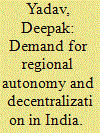

|
|
|
|
|
| Publication |
2013.
|
| Summary/Abstract |
The demand for regional autonomy has been a much debated issue in the Indian democracy for a long period of time. The question of to what extent regional units should be given freedom was discussed at length during Constituent Assembly debates as well .Article 1 of the Indian constitution declares "India that is Bharat shall be union of states". Indian union was established by incorporating basic features of both unitary and federal form of governments and thus, creating a federal form of government during peace time and converting it in to unitary one at the time of crisis. The success of Indian democracy has been a matter of great debate around the world and also a matter of great curiosity.
|
|
|
|
|
|
|
|
|
|
|
|
|
|
|
|
| 4 |
ID:
126660
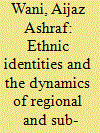

|
|
|
|
|
| Publication |
2013.
|
| Summary/Abstract |
The concept of regional and sub-regional identity as well as regional autonomy has captured the stage of Social Science. The regional autonomy aspirations and the sense of regional and sub-regional identity have offered a new dimension to the assertiveness of ethnic group. Regional identity demands in South and Southeast Asian societies have followed a uniform pattern. These regional autonomy demands evolved over a large span of time may be located in specific geographical and environmental spaces. At one level, these demands remained humane and inclusive, incorporating and reflecting broader human and universal values. At the other level, they acquired the traits of particularism which in the later stages of building multi-cultural and multi-ethnic nation states posed many problems. The plurality of politics is the hallmark of Jammu and Kashmir (J&K) State, and this polarity is essentially the result of cultural diversities that criss-cross the geographical and cultural landscape of Kashmir. The J&K State is not only a conglomerate of three distinct regions - Jammu, Kashmir, and Ladakh - but there are also regions within regions marked off from one another by geography, culture, and history. The politics of regional and sub-regionalism based on region, religion, caste, ethnicity, and so on continues to be stubbornly informed by their respective histories and cultures - thus the resistance against hegemony and the demand for sub-regional autonomies and Hill Development Councils. This article attempts at, looking into the dynamics of these assertions, its impact on the politics of the state, and to delineate the role of different socio-political and historical forces in shaping regional and sub-regional assertions in J&K without, however, suppressing the relative significance of different identity markers.
|
|
|
|
|
|
|
|
|
|
|
|
|
|
|
|
| 5 |
ID:
126661
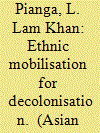

|
|
|
|
|
| Publication |
2013.
|
| Summary/Abstract |
This article attempts to communicate the methodological tension between subjectivity and objectivity by recording the aspiration of communities who are problematised both by colonialism and the modern nation-state. It highlights how colonial policy and practice contribute to the postcolonial imbroglio in Northeast India. It delineates how British colonial cartography always gave priority to 'administrative convenience' in the demarcation of boundaries, resulting in the division of ethnic community. It argues that Northeast India and the Indo-Burma borderland are not yet decolonised, as the government of India, without any rearrangement or alteration, adopts the colonial administrative boundaries, which divided ethnic communities. Neither the State Reorganisation Act (1956) nor the North-Eastern Areas (Reorganisation) Act (1971) fulfilled the aspiration of the segmented communities in the northeast, as they did in the mainland. The article also argues that the responses of the government of India towards the problems in Northeast India react to the manifested symptoms of the deep-rooted political problem rather than getting to the crux of the problem to find a solution.
|
|
|
|
|
|
|
|
|
|
|
|
|
|
|
|
| 6 |
ID:
114685
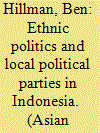

|
|
|
|
|
| Publication |
2012.
|
| Summary/Abstract |
Since Indonesia's return to multiparty democracy in 1999, national law makers have introduced regulations that effectively ban ethnic or regionally based political parties. A major exception to the rule can be found in the province of Aceh where ethnic separatists were granted the right to form their own political party to contest local elections in return for giving up their armed struggle for independence. In legislative elections held in 2009 the party of the former rebels - the Aceh Party - won a landslide victory. Drawing on in-depth interviews with national party leaders and parliamentarians, this article examines the implications of the rise of the Aceh Party for Indonesia's political party system and the potential for ethnic-based parties to resolve ethnic conflict and secessionism in other parts of Indonesia, including in Papua where the failure of special autonomy arrangements has led to increased militancy among indigenous Papuans.
|
|
|
|
|
|
|
|
|
|
|
|
|
|
|
|
| 7 |
ID:
132401


|
|
|
|
|
| Publication |
2014.
|
| Summary/Abstract |
Indonesia is often regarded as the natural leader of the Association of Southeast Asian Nations (ASEAN) in light of its geographical dimensions, large population, strategic position and natural resources. The country has felt entitled to a position of leadership and has generally been recognized by the other ASEAN members as first among equals. While the de facto leadership of Indonesia has traditionally been accepted as conventional wisdom, little attention has been given to the extent to which Jakarta has actually succeeded in exercising leadership in ASEAN and how its attempt to do so has been perceived by the other Southeast Asian states. The paper explores this question by focusing on Indonesia's ability to provide international public goods in the areas of security and economics, engage in conflict management and promote institution building. It argues that the country has sought to establish a stable and autonomous security environment, to conduct conflict meditation efforts in the Cambodian conflict and the South China Sea disputes, and to develop institutional mechanisms to promote security, democracy and human rights among other issues. Still, Indonesia's leadership in ASEAN has been incomplete due to resistance from some members to its preference for an autonomous regional order and in recent years a democratic form of domestic governance. Its leadership has so far also been limited to the political and security spheres, leaving other sectors, like the economy, to others.
|
|
|
|
|
|
|
|
|
|
|
|
|
|
|
|
| 8 |
ID:
089884
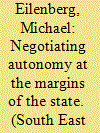

|
|
|
|
|
| Publication |
2009.
|
| Summary/Abstract |
Recent processes of decentralization have dramatically changed local political configurations and access to resources throughout Indonesia. In particular, the resource-rich regions at the margins of the state have, in the name of regional autonomy, experienced new spaces for manoeuvre in their claims for a larger share of forest resources. By stressing the unfolding relationship between local ethnic elites and the state, and their different strategies in negotiating and claiming authority over forests within Indonesia's changing forest regimes, the paper examines how local-level politics has taken on its special configuration in the remote border region of West Kalimantan, Indonesia. The author demonstrates this by focusing on the ongoing struggle over forest resources and by tracking the fate of a political movement for a new district in this resource-rich region. The paper further examines how current local elite strategies and networks can be related back to the period of border militarization in the 1960s and, once again, how these seem to challenge the exclusivity of the Indonesian-Malaysian border. The main argument is that central authority in the borderland has never been absolute, but waxes and wanes, and thus that state rules and laws are always up for local interpretation and negotiation, although the degree of such negotiation changes depending on the strength of the central state.
|
|
|
|
|
|
|
|
|
|
|
|
|
|
|
|
| 9 |
ID:
145752


|
|
|
|
|
| Summary/Abstract |
In the large body of literature on the granting of regional autonomy to end insurgency, an important related question has received little attention: what happens to other ethnic groups within the autonomous region? The new arrangement may end violence between the state and the guerrillas but will the latter simply turn their guns on other groups in the area? This article begins to fill this gap in the literature through a close examination of two mass killings conducted by rebels awarded an autonomous region in western Assam, Northeast India. Why would these militants—having won such far-reaching political and economic rewards after a decade of civil war—continue violence and risk these hard-won gains? I propose that violence against other ethnic communities in the new region is more likely in the presence of two main conditions. First, when the community receiving autonomy is a minority in the new region, and second, when only one militant faction is awarded power.
|
|
|
|
|
|
|
|
|
|
|
|
|
|
|
|
| 10 |
ID:
031105
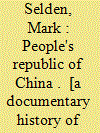

|
|
|
|
|
| Publication |
New York, Monthly Review Press, 1979.
|
| Description |
xxviii, 718p.hbk
|
|
|
|
|
|
|
|
|
|
|
|
Copies: C:1/I:0,R:0,Q:0
Circulation
| Accession# | Call# | Current Location | Status | Policy | Location |
| 018451 | 951.05/SEL 018451 | Main | On Shelf | General | |
|
|
|
|
| 11 |
ID:
113045
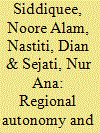

|
|
|
|
|
| Publication |
2012.
|
| Summary/Abstract |
Does fiscal decentralization empower sub-national governments to raise sufficient revenue from local sources thereby reducing their dependence on the national government? This paper addresses this question by focusing on Indonesia's most recent decentralization policy and assessing and analysing the role of local governments in this regard. Based on data collected from two different locations in Eastern Indonesia the paper shows that the dependency of local authorities on central government is excessive and that the share of local revenue in regional budget has remained rather small. It also shows that while the fiscal power granted to local governments is limited, a combination of politico-economic and contextual factors has further undermined the prospect of revenue mobilisation at the local level.
|
|
|
|
|
|
|
|
|
|
|
|
|
|
|
|
| 12 |
ID:
134206
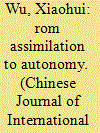

|
|
|
|
|
| Publication |
2014.
|
| Summary/Abstract |
This article examines regional autonomy in China's ethnic minority areas and its implications for minority rights in China. It argues that China's regional autonomy regime is in need of improvement in quest for national unity, social harmony and equality among ethnic groups in China. In light of past State-minority relations, as well as changing conditions in China, and by reference to international experience, the article offers suggestions for China to improve and implement minority rights legislation and policies. It argues that, under the existing political system in view of the existing basic framework on minorities, the Chinese State should adopt a new approach which encompasses elements of rule of law, deliberative democracy and international human rights standards. The new approach should guarantee respect for minority identities and seek means of establishing their respective autonomies and realizing their special rights. It should focus as much on the process as on the decisions, on the voices as on the results and on the individuals as on the groups. In this way, China's national regional autonomy would be oriented towards a complete policy of commitment to pluralistic values within the Chinese polity and would be more likely to satisfy the minority aspirations and the State's need for national stability and unity.
|
|
|
|
|
|
|
|
|
|
|
|
|
|
|
|
| 13 |
ID:
044258
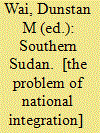

|
|
|
|
|
| Publication |
London, Frank Cass, 1973.
|
| Description |
xiii, 255p.hbk
|
| Standard Number |
0714629855
|
|
|
|
|
|
|
|
|
|
|
|
Copies: C:1/I:0,R:0,Q:0
Circulation
| Accession# | Call# | Current Location | Status | Policy | Location |
| 012744 | 962.904/WAI 012744 | Main | On Shelf | General | |
|
|
|
|
| 14 |
ID:
059587


|
|
|
| 15 |
ID:
132402
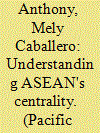

|
|
|
|
|
| Publication |
2014.
|
| Summary/Abstract |
There have been a number of articles about ASEAN's centrality in the regional security architecture of Asia. Yet, the notion of centrality remains undefined and under-operationalised. Implicit in the discourses of centrality is the idea of ASEAN's leadership, which in turn raises questions about ASEAN's ability to do so, given its limited capacity. This article defines ASEAN's centrality from the perspective of social network approach and argues that ASEAN's structural position in the density of networks that it has established and those that it has linkages with explains ASEAN's centrality. Despite its lack of material power, ASEAN has been able to claim centrality because of its position as a node in a cluster of networks, and this condition of 'high betweenness' allows ASEAN to exercise influence in regional processes with the tacit acceptance of major powers. However, while centrality may have been achieved, maintaining centrality in a rapidly changing regional environment compels ASEAN to address challenges to its centrality. This would necessarily include its ability to maintain consensus, carry out collective action and achieve its stated goals.
|
|
|
|
|
|
|
|
|
|
|
|
|
|
|
|
| 16 |
ID:
128528


|
|
|
|
|
| Publication |
2013.
|
| Summary/Abstract |
The year 2011 marked the tenth anniversary of the implementation of Indonesia's regional autonomy laws. This paper considers implications of more than a decade of decentralized governance for urban development in Indonesia. After a brief historical overview and consideration of the rationale for political and administrative decentralization issue image_86_4_Bunnellin that national context, we examine a range of critical perspectives on policy outcomes. Both media coverage and academic analyses have overwhelmingly cast decentralized governance as it has been implemented in Indonesia in a negative light. As a corrective to this, we have sought to identify positive outcomes and possibilities associated with Indonesia's large-scale decentralization project. In particular, we detail the cases of two cities which have been cast in a variety of rankings and media representations as success stories of urban development through decentralized governance: Solo (or Surakarta as the city is also formally named) and Surabaya. In the final section of the paper, we critically evaluate these two cases and discuss their wider implications.
|
|
|
|
|
|
|
|
|
|
|
|
|
|
|
|
|
|
|
|
|